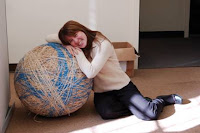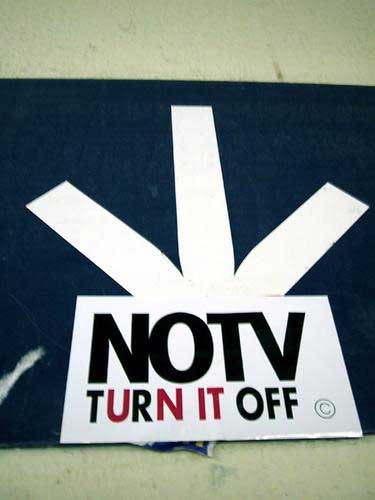8. Limit your media consumption. This tip won’t be for everyone, so if media consumption is important to you, please skip it (as with any of the other tips). However, I believe that the media in our lives — TV, radio, Internet, magazines, etc. — can come to dominate our lives. Don’t let it. Simplify your life and your information consumption by limiting it. Try a media fast.
When I originally looked down the list of topics for this project, I saw this one and immediately thought, "Yeah, this isn't going to happen". After all, #5 on my list of values relies entirely on media consumption. So I asked myself, if I did do this media fast, what would it look like? What are the things that I'd be cutting out? Movies. TV shows. Books. The internet. What on earth would I do with all of my free time on the days and nights when I don't have social commitments? What would I do to relax after a long day at work?
And then it hits me. It's about engagement.
Last night I was out with a friend of mine having a few drinks. We were chatting about life's challenges and the conversation, perhaps unsurprisingly, drifted to the topics of this blog. During our chat, she excused herself for a few minutes and I found myself reaching into my pocket, grabbing my phone, and checking e-mail, Facebook, texts, etc, until she returned. At that point we continued our conversation. Looking back on it I realize that this was a very significant event, and not necessarily in a good way.
Now, I put a lot of effort into the last two days minimizing interruptions and distractions and focusing on work. Holy cow, was it a massive difference from the norm! Even if I didn't leave work feeling like I got a ton accomplished, I left work knowing exactly what I got accomplished and where to pick it up tomorrow. This is a huge step forward for me. I made all of the distractions secondary throughout the day to the things of highest value, and only focused on things like Facebook and apps and e-mails when I wasn't focused on my priorities. This should be a huge win, right? And it is!
But it sheds some light on a key aspect of event management that we haven't talked about yet. That is, while we know how to make the most of the time in which we engage in our life's events, do we really need to be engaged every waking hour? What does it mean to disengage, and just as importantly, how do we do it?
As I started on this post last night, I've been thinking about this issue and attempting to be mindful of how often I take downtime and immediately try to make it productive time. The answer? A LOT. For example, based on some things I've been reading on Zen Habits, I've decided to try to switch from being a night owl to a morning person. So there I am, up at 6am, and finding that being awake meant I needed to be doing something immediately. After all, what was the purpose of being awake if I'm not actively working on something? If I'm just going to be standing around watching the sun rise, I could just as easily be sleeping, or reading, or getting ready for work.
And I noticed it was like this throughout the entire day. Walking to a meeting? Let's check my texts! Waiting for my food at lunch? Let's play some Words with Friends! Every time I wasn't actively engaged in work or a meeting, I was checking something or doing something. While it's probably TMI, but I couldn't even go to the restroom without using that time to check Facebook.
I've structured my life to minimize interruptions, but I haven't changed the fact that I feel this need to be doing something constantly. This probably shouldn't be surprising, but this may be a significant piece of why I feel so exhausted and stressed most of the time. It may also explain the habits that cause me to be a night owl in the first place.
For example, I always tell people that I feel like a little kid when it comes to going to bed. I watch the clock approaching the "eight hours until I have to get up" mark with dread, and when it finally arrives, I think to myself, "but I don't WANNA!" And, being an adult with no parents to make me go, I exercise my free will and stay up. In fact, I often stay up for several more hours until I can barely keep my eyes open. Then, the alarm goes off four or five hours later, I hit snooze until my alarm clock finally gives up on me. At that point I switch to periods of devout prayer in the hope that my internal clock will wake me up before I end up being more than an hour late for work. Luckily, on weekends, I don't have this problem. I can stay up even later and sleep until lunchtime to make up for it.
Not enough quality sleep and wildly varying sleeping patters; is it any wonder I'm exhausted?
But why am I doing it? I know that I should be getting more sleep. I hate the 30 minute rush to get ready in the morning and I hate losing half of my Saturdays and Sundays to sleeping in. I don't even do anything particularly useful when staying up late (except write these blog posts!).
Honestly, I think the answer is because I don't know how to stop. If I can get more into the day, I'm going to try to get more in. If there are five things I'm excited about doing, I want to do them all. And if I've only done two and it's time for bed, then I get resentful of everything else I did during the day. I know, I know, it sounds insane! But it seems just as insane to let the day go by without "making the most of it".
Now there are a lot of things that people engage themselves with, but to bring the focus back to media, few of those things are designed to be as addictive. How many television shows end on a cliffhanger that make feel like you can fit in just one more episode before bed? How many books egg you on to read just one more chapter to find out what happens next? How many video games push you to finish that one last mission or gain those last few experience points in order to level up?
The internet as a whole is terribly guilty of this, as everything about it is designed to make you click the next link, and the next one, and the next one, until two or three hours have gone by and you have maybe one memorable three minute YouTube video to show for it. And when you add the accessibility smartphones give us to have those hooks at your fingertips? Why wouldn't you want to be engaged in something with the potential to be interesting and exciting every chance you get? After all, what's the better alternative? Just sitting there staring?
Well, maybe it is.
Let's look at a few of examples of what non-stop engagement does to us on a daily basis:
- We have trouble sleeping because our brains start racing, looking for something to focus on, tending to engage in thoughts of work or some kind of other significant problem in our life that we certainly can't solve while lying in bed. And if we do fall asleep and start dreaming, we dream of those same problems and wake up exhausted.
- We have trouble focusing on things for long periods of time because as soon as there's a lull in the action we're looking for something new to hook our attention. Ever started daydreaming while listening to someone else talking, only to realize they're saying something really important and you've missed nearly all of it? It feels awful.
- We end up running at such a high level of energy that we burn ourselves out almost immediately and end up spending nearly every second of our day waiting for a moment of downtime. But we never get it, because as soon as we have that opportunity to make that time, we fill it with instant engagement through our media of choice.
Does this mean media is a bad thing? Absolutely not! But it can be deceptively corrosive if we allow ourselves to believe that engaging with it is the same as relaxation.
So for those of us for whom a media fast isn't realistic, I propose the following challenge isntead:
For 15 minutes out of every two waking hours, and preferably again right before you go to bed, stop whatever it is that you're doing. Or if you find yourself with a few minutes of downtime while waiting for something, resist the urge to find something to engage in.
Just stop working, reading, watching TV, playing video games, socializing, checking your phone, or whatever other activity you're in the middle of. Instead, take a walk outside, go stand on your porch, or find some quiet place where you can get away from where you've been. And what will you do when you get there?
Just breathe.
It may sound strange or cheesy if you've never done any kind of meditation or breathing exercises before, but believe me, it can be incredibly powerful. The best part is that it's very simple to do. Just focus your attention on your breath. Your normal every day breathing. If you notice thoughts or emotions entering your mind, you don't need to fight them. Just acknowledge them, and gently turn your attention back to your breathing. Empty your mind, and quietly enjoy the sensations of wherever your break takes you.
If you have a difficult time with this, try making a game out of it. Pay attention to the way it feels when you breath, where you feel the inhale and exhale within your body. See if you can figure out how to breathe in and feel it in different areas of your body. For starters, breathe into your abdomen, then when you can feel that, breathe into your chest, and finally move up until you can feel it in your head. Once you've done that, breathe into other areas of your body. See if you can find places that activate when you breathe, like your lower back, or may your side. If it aches, breathe into the area that it aches.
It's not unheard of to do this for a while and suddenly feel like laughing, or crying for apparently no reason at all other than that you're unearthing the burdens of the day (or perhaps from days, weeks, months or even years ago!) and letting them out into air to be carried off. Before you know it, your worries may feel like they're millions of miles away, or at the very least they'll feel much more approachable!
And when you're done, simply dive back in to whatever you were doing! Ideally you'll feel more centered and focused, allowing you to get even greater satisfaction out of what you're engaged in than you were previously, which, if you've been following along, will hopefully be the things that matter most to you.
Thanks for reading!
- Mitch





